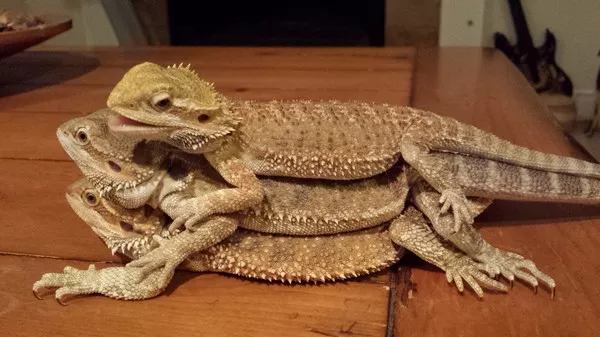Bearded dragons (Pogona vitticeps) have become popular reptile pets due to their gentle nature, unique appearance, and relatively simple care requirements. As omnivores, these fascinating creatures have a diverse diet that includes both animal-based and plant-based foods. Providing a balanced and nutritious diet is essential to ensure the health, vitality, and longevity of your bearded dragon. In this article, we will delve into the dietary preferences of bearded dragons, explore the foods they enjoy, and offer insights into creating a well-rounded meal plan for these captivating reptiles.
Understanding Bearded Dragon Dietary Needs
Bearded dragons are omnivorous reptiles, which means they consume a combination of animal matter and plant matter. Their dietary requirements evolve throughout their lives, with young dragons needing more protein for growth and adults requiring a balanced mix of nutrients to maintain optimal health.
A balanced bearded dragon diet includes:
Insects: These provide essential protein, fats, and some vitamins. Insects are a significant part of a young bearded dragon’s diet and remain an important element for adults as well.
Vegetables: A variety of vegetables offer vitamins, minerals, and fiber that contribute to overall health.
Leafy Greens: These provide hydration, vitamins, and minerals, playing a crucial role in maintaining proper hydration levels.
Fruits: Fruits are enjoyed as occasional treats due to their natural sugars.
Supplements: Calcium and vitamin supplements ensure that bearded dragons receive essential nutrients, especially for bone health.
Insects for Protein and Variety
Insects are a key component of a bearded dragon’s diet, particularly during their early stages of growth. Some commonly offered insects include:
Crickets: A staple for many bearded dragons, crickets provide a good balance of protein and chitin.
Dubia Roaches: These insects are an excellent alternative to crickets, offering high protein content and being easy to digest.
Mealworms: While high in protein, mealworms should be offered in moderation due to their tougher exoskeleton.
Superworms: These are larger and higher in fat compared to other insects, making them a less frequent treat.
Silkworms: Silkworms are an excellent source of protein and contain essential amino acids.
Vegetables and Leafy Greens for Health
Vegetables and leafy greens are vital components of a bearded dragon’s diet, contributing to their overall health, hydration, and digestion. Some suitable options include:
Collard Greens: High in calcium and vitamins, collard greens are a staple for many bearded dragons.
Mustard Greens: These greens provide variety and essential nutrients.
Turnip Greens: A good source of calcium and fiber, turnip greens can be part of a varied diet.
Kale: While nutritious, kale should be fed in moderation due to its high oxalate content.
Endive: Endive offers hydration and variety to the diet.
Fruits as Occasional Treats
Fruits are a delightful addition to a bearded dragon’s diet but should be offered sparingly due to their sugar content. Suitable fruits include:
Berries: Blueberries, raspberries, and strawberries are enjoyed by bearded dragons in small quantities.
Apples: Remove seeds and offer small, diced pieces of apple.
Pears: Like apples, remove seeds and provide diced pear as an occasional treat.
Melon: Watermelon, cantaloupe, and honeydew can be offered as treats.
Supplements for Nutritional Balance
Bearded dragons benefit from calcium and vitamin supplementation to ensure they receive essential nutrients. Dusting insects with calcium powder and offering a multivitamin supplement as directed by a veterinarian help maintain their health.
Creating a Balanced Meal Plan
To create a balanced meal plan for your bearded dragon, consider the following guidelines:
Variety: Offer a variety of insects, vegetables, leafy greens, and occasional fruits to ensure a well-rounded diet.
Age-Appropriate: Tailor the diet to your bearded dragon’s age. Young dragons need more protein, while adults require more greens and vegetables.
Supplements: Ensure proper calcium and vitamin supplementation, as directed by a reptile veterinarian.
Portion Control: Offer appropriate portion sizes to prevent overfeeding and maintain a healthy weight.
Water: Provide clean, fresh water at all times in a shallow dish.
Conclusion
Understanding what bearded dragons like to eat is a fundamental aspect of responsible pet ownership. Providing a diet that includes a mix of insects, vegetables, leafy greens, and occasional fruits helps ensure their nutritional needs are met. By offering variety, age-appropriate foods, and proper supplementation, you contribute to the well-being, vitality, and happiness of your bearded dragon companion. As you engage in their care, you forge a bond with these captivating reptiles and provide them with the foundation for a long, healthy life.
Recommended reading:


























